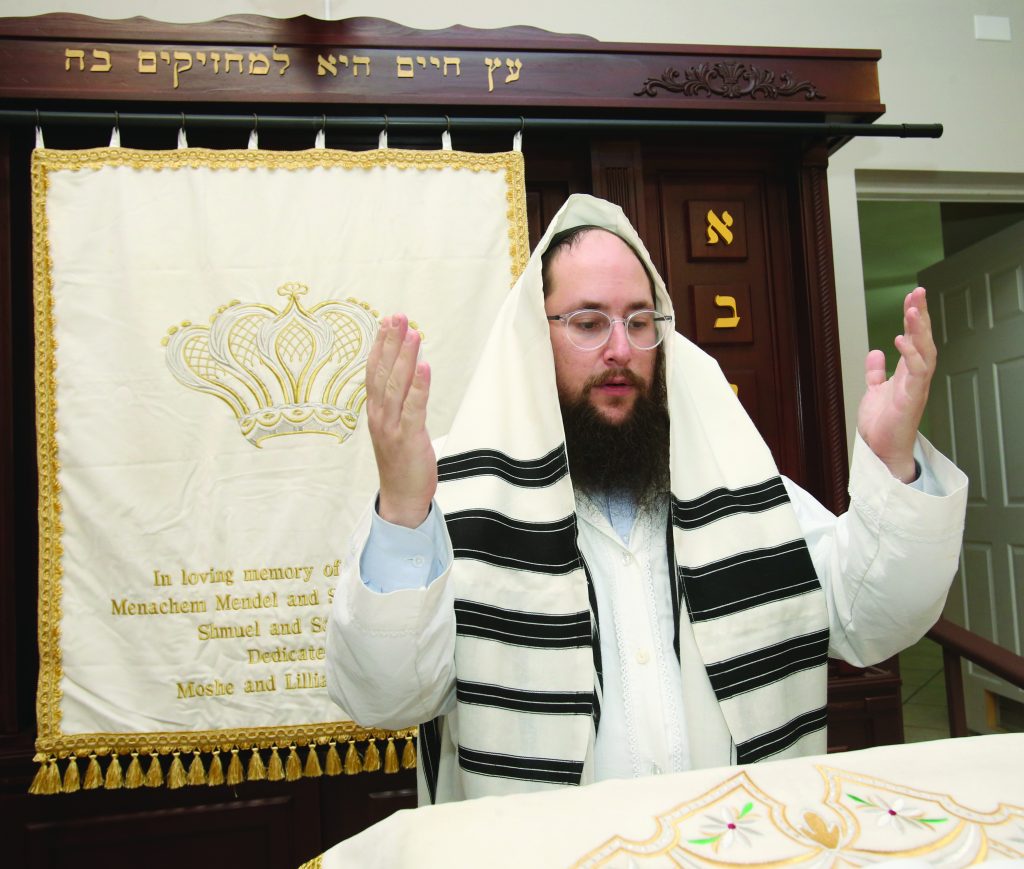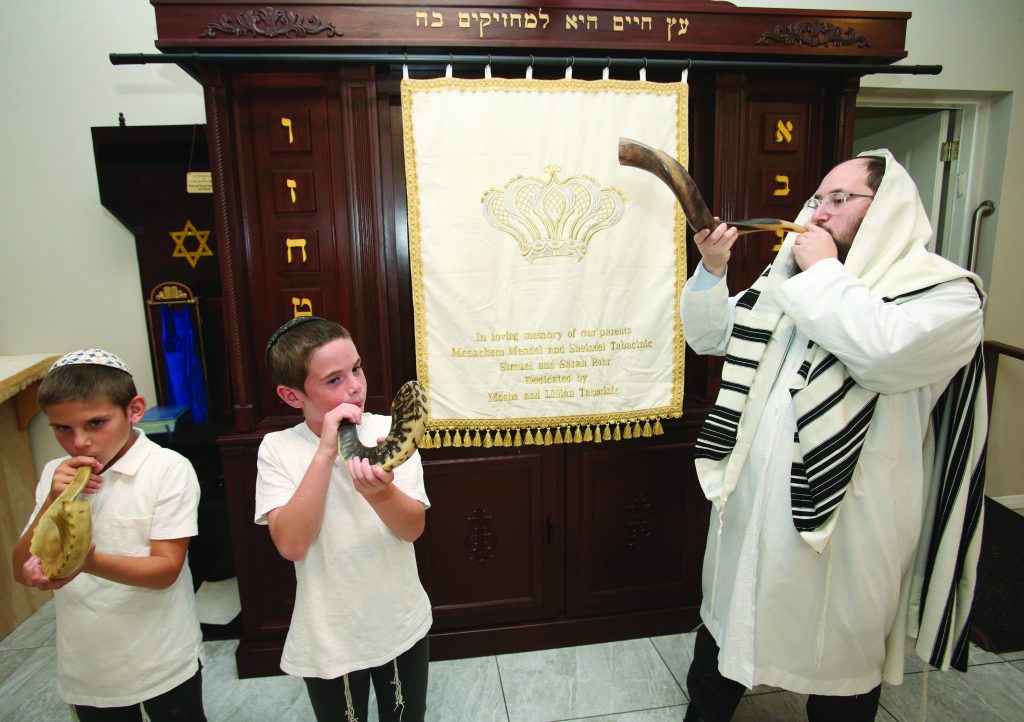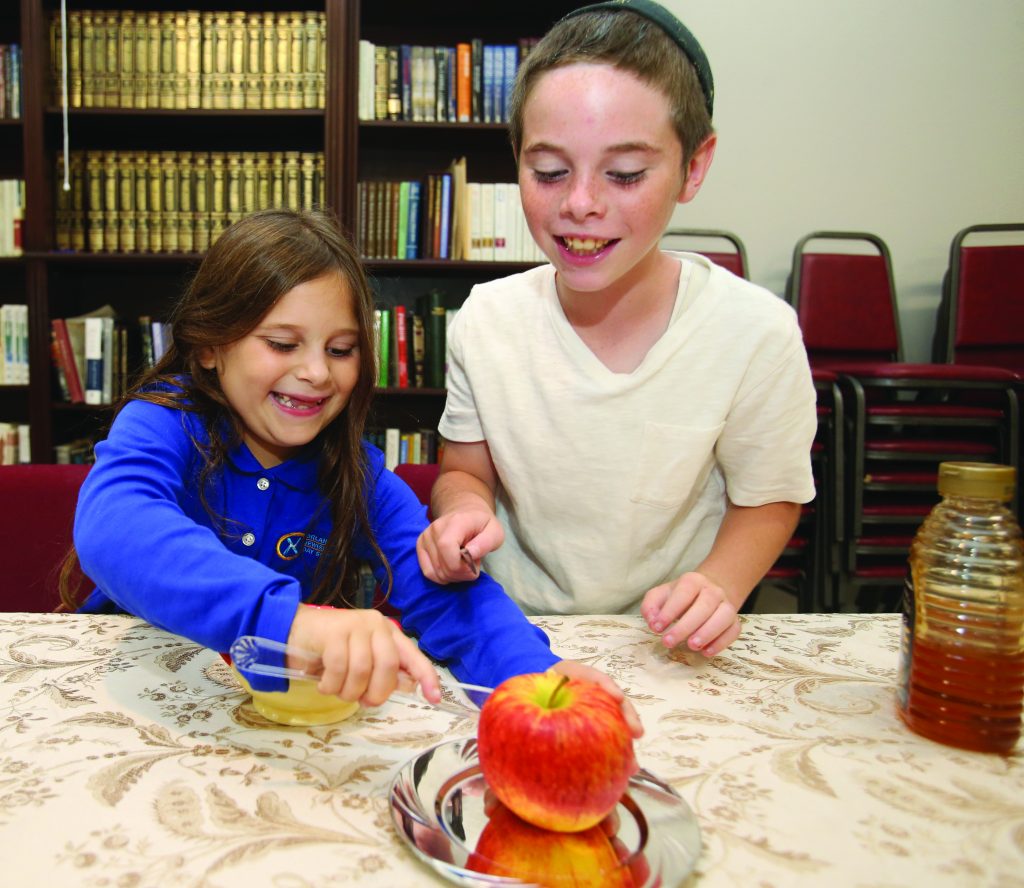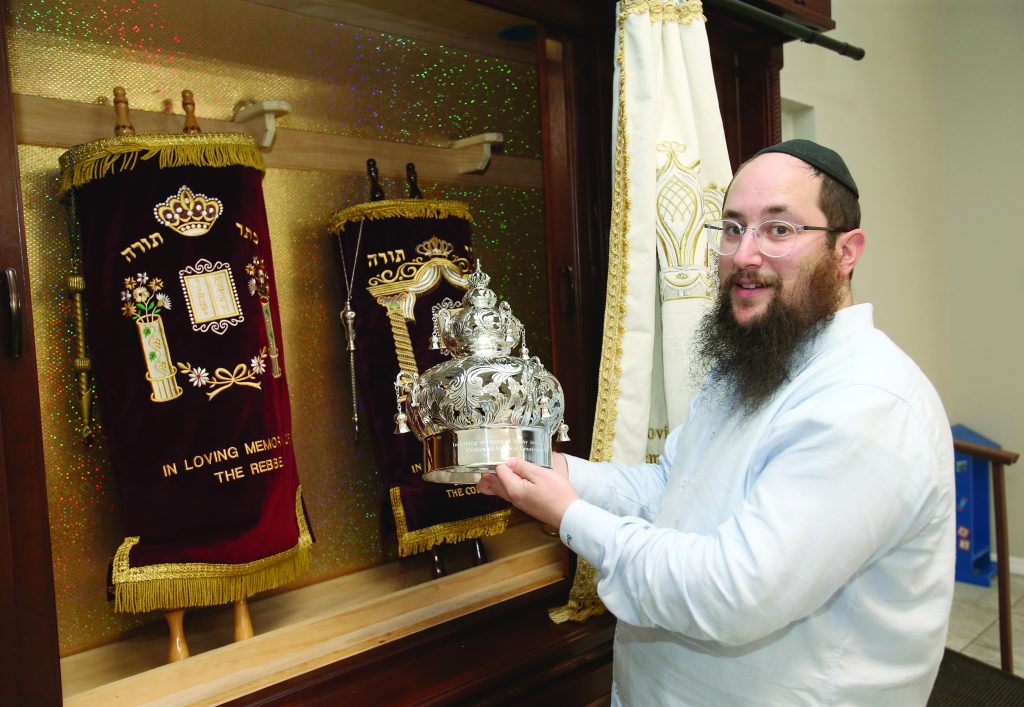Jewish community changes to cope with pandemic

Rabbi Yossi Hecht prays as he prepares for the High Holidays. [Bruce Ackerman/Ocala Gazette] 2020.

Rabbi Yossi Hecht prays as he prepares for the High Holidays. [Bruce Ackerman/Ocala Gazette] 2020.
Timing is everything.
However, sometimes life’s vagaries can cause their own series of repercussions with its ripples extending farther than we’d like.
For the Chabad Lubavitch Jewish Center of Ocala, The Villages and the Tri-County, the pandemic hit at an inopportune time, right before Passover, a major Jewish holiday.
“We were left with the conundrum of what are we going to do as far as the Jewish community goes,” said Rabbi Yossi Hecht of the Chabad Lubavitch Jewish Center. “We’re used to having a Seder here of over 100 people. At that point, we decided to do a Seder to go.”
The Chabad’s effort found them sending out hundreds of Seders throughout the community they serve, with packages going out to The Villages, Ocala, Citrus County and other communities in the region.
“We had volunteers going and delivering these packages, and people were able to celebrate Passover at home,” said Hecht. “It also came with steps, guides and directions, on how to do that. And then, we continued to do that for the next few months (delivering packages).”
Plans also have been made for the High Holidays, providing people with an option of how they can celebrate Rosh Hashanah, Hecht said. The rabbi found that there are a variety of viewpoints when it comes to the pandemic.
“We wanted to make available options to anyone, however they feel comfortable to celebrate,” Hecht said. “Option No. 1 is for those who are afraid to attend socially connected services at all. So, for those who don’t want to be socially near anyone, we have Rosh Hashanah to go. Basically, what that is is that we’ll have a Rosh Hashanah dinner — all of the traditional things, apples, honey, brisket, honey cake and round challah, things of that nature — and they’ll be able to have their own traditional Rosh Hashanah dinner at home.”

Rabbi Yossi Hecht blows the Shofar with two of his sons, Mendy, 10, left, and Shimshon, 9, center,. [Bruce Ackerman/Ocala Gazette] 2020.
The dinner will also include a book with guidelines, step by step, showing them how to celebrate, Hecht said. There’s also an option where people can purchase a full Mahzor of prayer for the High Holidays, as well as a shofar, a ram’s horn, which is also traditional to blow on Rosh Hashanah.
“People should know that they have everything they need. They don’t have to be afraid to go out for whatever reason,” Hecht said.
The second option is an outdoor service, and it will be offered each day during the High Holidays. Rosh Hashanah is three days, and services will be held Friday, Sept. 18, at 7 p.m., and on Sept. 19 and Sept. 20 at 5 p.m. each day. After the services, there will prepackaged food, so there won’t be any sharing, and people can take it with them to go or eat it at the Chabad, said Hecht.
“We expect to have a nice crowd for that,” said Hecht. “We’re going to do it out here, hoping the weather will be nice. We’re going to try to put up some tents. Some people don’t want to sit under a tent, so we have the option that you can be out of the tent. Again, it’s about us offering what we can, and allowing people to do whatever is comfortable to them. That’s what we’re trying to do.”
Connection and Sense of Belonging
The Pandemic has been a time of transformation, changing the way we live, but that was felt more acutely in certain communities, where interaction and engagement is very much part of one’s way of life.

Tila Hecht, 7, and her brother, Shimshon, 9, slice an apple to eat with honey as they prepare for the High Holidays. [Bruce Ackerman/Ocala Gazette] 2020.
“As a Jew, we live a very social life as a community, and though here it’s a much smaller community, it’s very much part of our culture,” Hecht said. “You go and pray every morning with a Minyan, and that means people come together to pray. During the pandemic, all synagogues were closed. On Shabbos, on holidays, you get together. You have dinners together. You celebrate together, but everyone had to be separated.”
Globally, Jewish communities faced many of the same challenges with being locked down, having to stay at home during Passover and other holidays. People found themselves having to do things on their own, without having a rabbi leading them and guiding them, Hecht said.
“For me, it’s very different as a leader of a community,” Hecht said. “Now, we’re suddenly challenged with how do we reach people in a way that’s different? How do we connect with people in a way that’s different?”
The Chabad has been working diligently to make sure they stay in touch with the community and has been offering a few classes online for months. Every Friday, they have online services at 6 p.m., which is before the Shabbat. They had been delivering packages to people for months prior to the pandemic, but that has increased over the past few months.
Hecht’s daughter hosts a Kosher baking show every Thursday night, which has been well-embraced by the community.
“She teaches women how to bake,” Hecht said. “We tell them before what ingredients to get. They go out and get the ingredients, and they bake them along with her on the computer. She’s showing them what to do. We’ll probably have a few of those before the High Holidays. We’ll teach people how to make challah and honey cake and things like that.”
The pandemic has been life-transforming in many ways, with people adjusting to a rapidly changing environment.

Rabbi Yossi Hecht holds the crown of a Torah in front of two Torahs as he prepares for the High Holidays at Chabad of Ocala and The Villages in Oxford, Fla. Rabbi Hecht and Chabad of Ocala and The Villages have had to reschedule many of their traditional Jewish events because of the coronavirus pandemic. Chabad of Ocala and The Villages will be dedicating their third Torah on Sunday, Sept. 13 before the start of the High Holidays. [Bruce Ackerman/Ocala Gazette] 2020.
“This was the first time since we moved, in over 10 years, that we had Passover Seder with just our family,” Hecht said. “We’re used to having a big Seder with the whole community. For us to go weeks on end without having people come be with us, be part of our community, it’s a real change and you have to adapt to it. There are modern ways of connecting — Zoom, Facebook Live, which we do all that stuff –but it’s not the same as being in person, and even now we’re still going to be socially distanced with masks and things of that nature.”
However, adults weren’t the only ones affected by the pandemic, with COVID-19 changing the way we worship, do business, interact and the way we live.
“Our children weren’t able to go to school, but now our schools are opening,” Hecht said. “They have to adapt to not being with other peers, not being in a classroom setting, even though you had something to offer online, but it’s not the same. It brought about to our children such a chaos in their life, and they’re trying to thread that all back together again.”
The Chabad plays in an important role in the lives of those in Jewish community and is there to help those who are in need.
“We’ve been trying to reach out the best way possible,” Hecht said. “I want them to know if they have a friend or neighbor or someone who needs help, we’re there for them. Whatever we’re able to do that’s what we’re here for, especially when it comes to the High Holidays, which is a time that people desperately need others in their life to be with them.”





